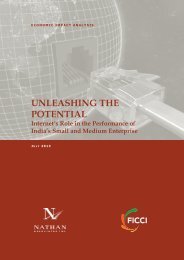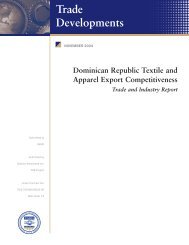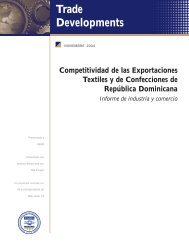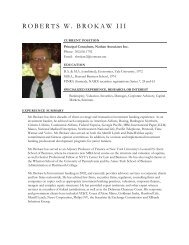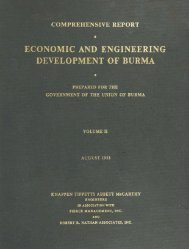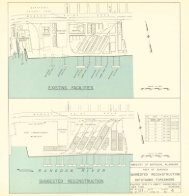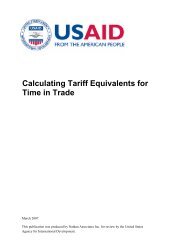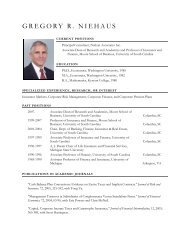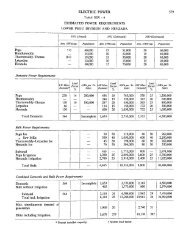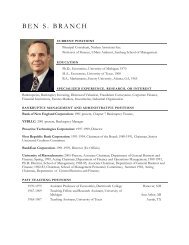Putting it to Work in Developing Countries - Nathan Associates
Putting it to Work in Developing Countries - Nathan Associates
Putting it to Work in Developing Countries - Nathan Associates
You also want an ePaper? Increase the reach of your titles
YUMPU automatically turns print PDFs into web optimized ePapers that Google loves.
1998. 11 But many advocates, particularly among<br />
developed countries, cont<strong>in</strong>ue <strong>to</strong> argue that by<br />
reduc<strong>in</strong>g host-country <strong>in</strong>vestment restrictions<br />
and better protect<strong>in</strong>g <strong>in</strong>ves<strong>to</strong>rs’ rights an agreement<br />
will give rise <strong>to</strong> larger, more susta<strong>in</strong>ed<br />
flows of FDI <strong>to</strong> develop<strong>in</strong>g countries.<br />
Governments, however, cannot guarantee private<br />
<strong>in</strong>vestment flows. And w<strong>it</strong>hout such a guarantee<br />
many develop<strong>in</strong>g countries are reluctant <strong>to</strong><br />
accept lim<strong>it</strong>s on <strong>in</strong>vestment policies that promote<br />
their own perceived economic <strong>in</strong>terests.<br />
Should International Accords<br />
Include Inves<strong>to</strong>r Obligations<br />
The extent <strong>to</strong> which <strong>in</strong>vestment agreements<br />
should comm<strong>it</strong> signa<strong>to</strong>ries <strong>to</strong><br />
impos<strong>in</strong>g obligations on <strong>in</strong>ves<strong>to</strong>rs and<br />
what k<strong>in</strong>d of obligations should be<br />
imposed are matters of debate. Many of<br />
these arguments are an extension of disputes<br />
about the implications of FDI for<br />
development, especially w<strong>it</strong>h regard <strong>to</strong><br />
environmental and labor issues. Thus,<br />
some argue that <strong>in</strong>ves<strong>to</strong>rs from developed<br />
countries should meet their home<br />
countries’ environmental standards<br />
when <strong>in</strong>vest<strong>in</strong>g <strong>in</strong> develop<strong>in</strong>g countries<br />
lack<strong>in</strong>g such standards. Others argue<br />
that governments should prevent homecountry<br />
<strong>in</strong>ves<strong>to</strong>rs from manufactur<strong>in</strong>g<br />
overseas products banned <strong>in</strong> their home<br />
markets. Some labor groups say that<br />
governments should hold firms<br />
accountable <strong>to</strong> high standards for labor<br />
relations overseas regardless of local<br />
requirements. Some countries have<br />
argued that home governments should<br />
ensure that their firms not engage <strong>in</strong><br />
anticompet<strong>it</strong>ive or restrictive bus<strong>in</strong>ess<br />
practices overseas. Some countries advocate<br />
cooperation and shar<strong>in</strong>g of <strong>in</strong>formation<br />
generally <strong>to</strong> regulate the actions<br />
of transnational corporations.<br />
INVESTMENT ACCORDS—IN<br />
PRACTICE, IN PROSPECT<br />
Bilateral agreements have proliferated but perhaps<br />
w<strong>it</strong>h lim<strong>it</strong>ed effect. Multilateralism <strong>in</strong><br />
<strong>in</strong>vestment agreements seems as unlikely as ever.<br />
But regional trade agreements and dispute settlement<br />
are spread<strong>in</strong>g and will probably cont<strong>in</strong>ue<br />
<strong>to</strong> do so.<br />
RECORD TO DATE<br />
Measured aga<strong>in</strong>st the objective of <strong>in</strong>creas<strong>in</strong>g<br />
FDI flows, the practical impact of BITs, regional<br />
agreements, and WTO <strong>in</strong>vestment action is<br />
mixed.<br />
L<strong>it</strong>tle benef<strong>it</strong> from BITs. The proliferation of<br />
BITs suggests that they satisfy the demands of<br />
the states conclud<strong>in</strong>g them. Firms <strong>in</strong> developed<br />
countries receive add<strong>it</strong>ional protections if they<br />
choose <strong>to</strong> <strong>in</strong>vest <strong>in</strong> a BIT partner’s terr<strong>it</strong>ory, but<br />
do BITs attract foreign <strong>in</strong>vestment 12 Research<br />
suggests that they do not. 13 A review of 20 years<br />
of data and FDI flows from OECD members <strong>to</strong><br />
31 develop<strong>in</strong>g countries shows that BIT signa<strong>to</strong>ries<br />
were no more likely <strong>to</strong> receive add<strong>it</strong>ional<br />
<strong>in</strong>vestment than countries w<strong>it</strong>hout such treaties.<br />
In add<strong>it</strong>ion, countries w<strong>it</strong>h weak domestic <strong>in</strong>st<strong>it</strong>utions,<br />
<strong>in</strong>clud<strong>in</strong>g those for protection of property,<br />
have not benef<strong>it</strong>ed significantly by sign<strong>in</strong>g<br />
a BIT and countries already reform<strong>in</strong>g and w<strong>it</strong>h<br />
strong domestic <strong>in</strong>st<strong>it</strong>utions ga<strong>in</strong> l<strong>it</strong>tle from<br />
do<strong>in</strong>g so.<br />
FTA/RIA boost for FDI. BITs alone seem <strong>to</strong><br />
have a negligible effect on <strong>in</strong>vestment flows, but<br />
strengthen<strong>in</strong>g <strong>in</strong>ves<strong>to</strong>r protections and reduc<strong>in</strong>g<br />
trade barriers does appear <strong>to</strong> <strong>in</strong>crease FDI. 14<br />
W<strong>it</strong>ness the remarkable rise <strong>in</strong> FDI flows <strong>in</strong><strong>to</strong><br />
Mexico as NAFTA <strong>to</strong>ok effect. Some experts<br />
suggest that FTAs <strong>in</strong> general tend <strong>to</strong> <strong>in</strong>crease<br />
FDI, 15 others that the liberalization of Mexico’s<br />
<strong>in</strong>vestment law <strong>in</strong> 1993, before NAFTA, made <strong>it</strong><br />
easier for firms <strong>to</strong> take advantage of North<br />
American productiv<strong>it</strong>y-adjusted wage differentials.<br />
Nonetheless, NAFTA’s protections have<br />
provided <strong>in</strong>ves<strong>to</strong>rs add<strong>it</strong>ional comfort and offset<br />
the disadvantages of Mexico’s <strong>in</strong>vestment<br />
75



